- Home
- Nick Hornby
The Complete Polysyllabic Spree
The Complete Polysyllabic Spree Read online
PENGUIN BOOKS
THE COMPLETE POLYSYLLABIC SPREE
‘A wonderful book – lucid, funny, sharp, truthful, cheeky, erudite, surprise-crammed, and emanating a delicious tang of sophisticated amusement’ Lloyd Evans, Spectator
‘Delightful… shot through with Hornby’s dry humour and he is engagingly enthusiastic’ Mail on Sunday
ABOUT THE AUTHOR
Nick Hornby is the bestselling author of High Fidelity, About a Boy, How to Be Good and A Long Way Down (shortlisted for the 2005 Whitbread Novel of the Year Award), as well as the non-fiction Fever Pitch and 31 Songs. He is the recipient of the E. M. Forster Award, the W. H. Smith Award for Fiction and the Writers’ Writer Award at the Orange International Writers’ Festival. He lives in Highbury, North London.
THE COMPLETE
POLYSYLLABIC
SPREE
BY
NICK HORNBY
PENGUIN BOOKS
PENGUIN BOOKS
Published by the Penguin Group
Penguin Books Ltd, 80 Strand, London WC2R 0RL, England
Penguin Group (USA) Inc., 375 Hudson Street, New York, New York 10014, USA
Penguin Group (Canada), 90 Eglinton Avenue East, Suite 700, Toronto, Ontario, Canada M4P 2Y3
(a division of Pearson Penguin Canada Inc.)
Penguin Ireland, 25 St Stephen’s Green, Dublin 2, Ireland (a division of Penguin Books Ltd)
Penguin Group (Australia), 250 Camberwell Road, Camberwell, Victoria 3124, Australia
(a division of Pearson Australia Group Pty Ltd) Penguin Books India Pvt Ltd,
11 Community Centre, Panchsheel Park, New Delhi – 110 017, India
Penguin Group (NZ), 67 Apollo Drive, Rosedale, North Shore 0632, New Zealand
(a division of Pearson New Zealand Ltd)
Penguin Books (South Africa) (Pty) Ltd, 24 Sturdee Avenue, Rosebank,
Johannesburg 2196, South Africa
Penguin Books Ltd, Registered Offices: 80 Strand, London WC2R 0RL, England
www.penguin.com
First published by Viking 2006
Published in Penguin Books 2007
1
Copyright © Nick Hornby, 2006
All rights reserved
The acknowledgements on p. 274 constitute an extension of this copyright page
The moral right of the author has been asserted
OPEN MARKET EDITION
EISBN: 978–0–141–90273–9
For my wife
TABLE OF CONTENTS
INTRODUCTION
SEPTEMBER 2003
Stocking up in Hay-on-Wye; polishing off an author’s oeuvre in a week; a new thriller from the brother-in-law.
OCTOBER 2003
Bad football grammar; John McEnroe as Holden Caulfield; the Dickens-standard for the appropriate length of a literary biography.
NOVEMBER 2003
Football season cripples the pace; the Larry David–Richard Yates connection; plot-busting blurbs; literary hoaxaphilia.
DECEMBER 2003/JANUARY 2004
Rescinding and refunding a previous recommendation; the impossibility of reading a Victorian novel in Los Angeles; a balanced fictional diet.
GEORGE AND SAM: AUTISM IN THE FAMILY
Charlotte Moore is frank about the hardships of raising autistic children, but she’s still managed to write the funniest book of the year.
FEBRUARY 2004
An edible poem; mandarin writers vs. vernacular ones; the futility of moving the pram from the hall.
MARCH 2004
Reconciling the holidays with a new agenda; reading vouchers; the Cultural Fantasy Boxing League.
APRIL 2004
The distaste of one’s own cooking (and writing); Amazon reviewers; a non-fictional gangland less fun but more entertaining than the real one.
MAY 2004
Following through on the Dickens promise; a retort to spareness; computer-animated classics; weedy young women.
DAVID COPPERFIELD
This passage from ‘Dickens’s Hamlet’ extends well beyond its plot-function in order to hear more from a guy who shouts ‘Goroo!’ a lot.
JUNE 2004
The benefits of peeking into tortured lives; bad literature parties vs. rocking gangster parties; contraception.
‘IMPOSSIBLE DREAM’
Here’s a modern poem by Tony Hoagland which won’t make you swear.
JULY 2004
Reading begets reading in strange and unscientific ways; comics clash with classics; lascivious emails.
AUGUST 2004
The good pop novel; suicidal authors of abstract works; vulgar narrative tendencies.
SEPTEMBER 2004
An unnamed literary novel; an unnamed literary biography; blockbusters; finger-steepling and sharks (in the same book!).
OCTOBER 2004
Sex with cousins; instant classics; the impossibility of reading it all.
TWENTY THOUSAND STREETS UNDER THE SKY
Looking to fly from Dickens to Martin Amis with just one overnight stop? Patrick Hamilton is your man.
NOVEMBER 2004
The insane capriciousness of the average critic; the well-stocked bookshelf finally pays off; when innovations stop looking like mistakes.
A LIFE IN LETTERS
Useful advice – and tough love – from A. Chekhov.
FEBRUARY 2005
The mystique (and apocalyptic imagination) of Bob Dylan; making a point about Philip Roth.
MARCH 2005
On not walking into a lamp-post but nevertheless enjoying a thriller; having a walk-on part in a friend’s book; and hanging out with the very old and the very young.
ASSASSINATION VACATION
The author gets a history lesson from Sarah Vowell in Gramercy Park.
APRIL 2005
No more novels about literature please; the pleasures of spotting where you used to live in a novel; plaudits but no foreign sales for John Harris.
MAY 2005
Different national tastes in bird books; true crime then (Capote) and now (Gourevitch); two books which really have the mucus.
JUNE/JULY 2005
Coming to terms with my limitations: I don’t understand SF; my discovery of Adrian Mole; music as torture; this month’s Book by a Friend.
AUGUST 2005
Are Martin Amis and Marilynne Robinson modern classics? My sister produces the greatest book ever written; reading for work; Walter Mosley disproves my theory about series and stand-alones.
SEPTEMBER 2005
Losing my appetite for books; the best bookshops in the world; the profound effect of literature on a life.
CITIZEN VINCE
Vince helps out a call-girl, and has an interesting philosophical debate about blow-jobs with her client, in this terrific opening scene from Jess Walter’s novel.
OCTOBER 2005
Not recognizing much in Candide; reading about American lives.
NOVEMBER 2005
Anthony Burgess proves right – and wrong – about Michael Frayn; the book of the film is a surprise; a bad recommendation from a friend.
FEBRUARY 2006
Foul-mouthed Philip Larkin; is Robert Penn Warren better than the Odyssey? My new bible.
MARCH 2006
I might only read books about animals from now on; writing books for others; rereading William Cooper.
GHOSTING
Jennie Erdal learns she has to write a love story, very requited and very sexy.
APRIL 2006
The definitive book on vile, abusive, misogynistic behaviour; three great recommendations from John Betjeman; The Office meets Kafka in a new novel.
THEN WE CAME TO THE END
J
oshua Ferris manages to convey the mundaneness and the mystery of office life – and make it funny too.
MAY 2006
The convectional-rainfall theory of book-reading; walking on the moon and making a mess of the Earth; all that’s good about graphic novels; can a book which misquotes the Bible be any good?
PERSEPOLIS
In her blocks of black-and-white graphics Marjane Satrapi shows the true colour of life in Iran.
JUNE 2006
Swapping books on tour; making narrative coherence out of awful accident; feeling smart when reading Freakonomics – but what’s it about?
ACKNOWLEDGEMENTS
INDEX OF STUFF HE’S BEEN READING
INTRODUCTION
I began writing this column in the summer of 2003. I had just had the reading experience described at the beginning of this book, and it seemed to me that what I had chosen to read in those few weeks contained a narrative, of sorts – that one book led to another, and thus themes and patterns emerged, patterns that might be worth looking at. And, of course, that was pretty much the last time my reading had any kind of logic or shape to it. Ever since then my choice of books has been haphazard, whimsical and entirely shapeless.
It still seemed like a fun thing to do, though, writing about reading, as opposed to writing about individual books. At the beginning of my writing career I reviewed a lot of fiction, but I had to pretend, as reviewers do, that I had read the books outside of space, time and self – in other words, I had to pretend that I hadn’t read them when I was tired and grumpy, or drunk, that I wasn’t envious of the author, that I had no agenda, no personal aesthetic or personal taste or personal problems, that I hadn’t read other reviews of the same book already, that I didn’t know who the author’s friends and enemies were, that I wasn’t trying to place a book with the same publisher, that I hadn’t been bought lunch by the book’s doe-eyed publicist. Most of all I had to pretend that I hadn’t written the review because I was urgently in need of a quick couple of hundred quid. Being paid to read a book and then write about it creates a dynamic which compromises the reviewer in all kinds of ways, very few of them helpful.
So this column was going to be different. Yes, I would be paid for it, but I would be paid to write about what I would have done anyway, which was read the books I wanted to read. And if I felt that mood, morale, concentration levels, weather or family history had affected my relationship with a book, I could and would say so. Inevitably, however, the knowledge that I had to write something for the Believer at the end of each month changed my reading habits profoundly. For a start, I probably read more books than I might otherwise have done. I suspect that I used to take a longer break between books, a couple of days, maybe, during which time I’d carry a copy of the New Yorker or Mojo around with me, but now I push on with the next book, scared I won’t have enough to write about (or that I’ll look bad, unbookish and unworthy of the space in a publication as smart as the Believer). Magazines have been the real casualties of this regime (although the Economist has survived, partly to replace the newspapers I’m not reading).
It was the very nature of the Believer itself, however, that really shook up my reading, I hope for ever. The magazine, which is five months older than the column, is a broad church, and all sorts of writers (and artists, film-makers and other creative types) are welcome to stand in the pulpit and preach, but it has one commandment: THOU SHALT NOT SLAG ANYONE OFF. As I understand it, the founders of the magazine wanted one place, one tiny corner of the world, in which writers could be sure that they weren’t going to get a kicking; predictably and depressingly, this ambition was mocked mercilessly, mostly by those critics whose children would go hungry if their parents weren’t able to abuse authors whose books they didn’t much like.
I understood and supported the magazine’s stance, which seemed admirable and entirely unproblematic to me – until I had to write about the books I’d read which I hadn’t much liked. The first couple of times this happened, earnest discussions took place with the magazine’s editors, who felt that I’d crossed a line, and I either rewrote the offending passages so that I struck a more conciliatory tone, or the offending books and writers became anonymous. I didn’t mind in the least, and in any case it gave me the opportunity to mock the Believer’s ambition mercilessly. (For the record: there is no Polysyllabic Spree. I deal with Vendela Vida and Andrew Leland, editor and managing editor of the Believer respectively, and they are neither humourless nor evangelical. They even watch television, I think.)
The Believer’s ethos did, however, make me think about what and why I read. I didn’t want to keep rewriting offending passages in my columns, and I certainly didn’t want to keep using the phrases ‘Unnameable writer’ or ‘Anonymous novel’. So what to do? My solution was to try to choose books I knew I would like. I’m not sure this idea is as blindingly obvious as it seems. We often read books that we think we ought to read, or that we think we ought to have read, or that other people think we should read (I’m always coming across people who have a mental, sometimes even an actual, list of the books they think they should have read by the time they turn forty, fifty or dead); I’m sure I’m not the only one who harrumphs his way through a highly praised novel, astonished but actually rather pleased that so many people have got it so wrong. As a consequence, the first thing to be cut from my reading diet was contemporary literary fiction. This seems to me to be the highest-risk category – or the highest risk for me, at any rate, given my tastes.
I am not particularly interested in language. Or rather, I am interested in what language can do for me, and I spend many hours each day trying to ensure that my prose is as simple as it can possibly be. But I do not wish to produce prose that draws attention to itself, rather than the world it describes, and I certainly don’t have the patience to read it. (I suspect that I’m not alone here. That kind of writing tends to be admired by critics more than by book-buyers, if the best-seller lists can be admitted as evidence: the literary novels that have reached a mass audience over the last decade or so usually ask readers to look through a relatively clear pane of glass at their characters.) I am not attempting to argue that the books I like are ‘better’ than more opaquely written novels; I am simply pointing out my own tastes and limitations as a reader. To put it crudely, I get bored, and when I get bored I tend to get tetchy. It has proved surprisingly easy to eliminate boredom from my reading life.
And boredom, let’s face it, is a problem that many of us have come to associate with books. It’s one of the reasons why we choose to do almost anything else rather than read; very few of us pick up a book after the children are in bed and the dinner has been made and the dirty dishes cleared away. We’d rather turn on the television. Some evenings we’d rather go to all the trouble of getting into a car and driving to a cinema, or waiting for a bus that might take us somewhere near one. This is partly because reading appears to be more effortful than watching TV, and usually it is, although if you choose to watch one of the HBO series, such as The Sopranos or The Wire, then it’s a close-run thing, because the plotting in these programmes, the speed and complexity of the dialogue are as demanding as a lot of the very best fiction.
One of the problems, it seems to me, is that we have got it into our heads that books should be hard work, and that unless they’re hard work, they’re not doing us any good. I recently had conversations with two friends, both of whom were reading a very long political biography that had appeared in many of 2005’s ‘Books of the Year’ lists. They were struggling. Both of these people are parents – they each, coincidentally, have three children – and both have demanding full-time jobs. And each night, in the few minutes they allowed themselves to read before sleep, they ploughed gamely through a few paragraphs about the (very) early years of a major twentieth-century world figure. At the rate of progress they were describing, it would take them many, many months before they finished the book, possibly even decades. (One of them told me that he’d put it
down for a couple of weeks, and on picking it up again was extremely excited to see that the bookmark was much deeper into the book than he’d dared hope. He then realized that one of his kids had dropped it, and put the bookmark back in the wrong place. He was crushed.) The truth is, of course, that neither of them will ever finish it – or at least, not in this phase of their lives. In the process, though, they will have reinforced a learned association of books with struggle.
I am not trying to say that the book itself was the cause of this anguish. I can imagine other people racing through it, and I can certainly imagine these two people racing through books that others might find equally daunting. It seems clear to me, though, that the combination of that book with these readers at this stage in their lives is not a happy one. If reading books is to survive as a leisure activity – and there are statistics which show that this is by no means assured – then we have to promote the joys of reading, rather than the (dubious) benefits. I would never attempt to dissuade anyone from reading a book. But please, if you’re reading a book that’s killing you, put it down and read something else, just as you would reach for the remote if you weren’t enjoying a TV programme. Your failure to enjoy a highly rated novel doesn’t mean you’re dim – you may find that Graham Greene is more to your taste, or Stephen Hawking, or Iris Murdoch or Ian Rankin. Dickens, Stephen King, whoever. It doesn’t matter. All I know is that you can get very little from a book that is making you weep with the effort of reading it. You won’t remember it, and you’ll learn nothing from it, and you’ll be less likely to choose a book over Big Brother next time you have a choice.
‘If reading is a workout for the mind, then Britain must be buzzing with intellectual energy,’ said one sarcastic columnist in the Guardian.‘Train stations have shops packed with enough words to keep even the most muscular brain engaged for weeks. Indeed, the carriages are full of people exercising their intellects the full length of their journeys. Yet somehow, the fact that millions daily devour thousands of words from Hello, the Sun, The Da Vinci Code, Nuts and so on does not inspire the hope that the average cerebrum is in excellent health. It’s not just that you read, it’s what you read that counts.’This sort of thing – and it’s a regrettably common sneer in our broadsheet newspapers – must drive school librarians, publishers and literacy campaigners nuts. In Britain, more than twelve million adults have a reading age of thirteen or under, and yet some clever-dick journalist still insists on telling us that unless we’re reading something proper, then we might as well not bother at all.

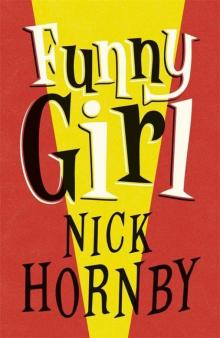 Funny Girl
Funny Girl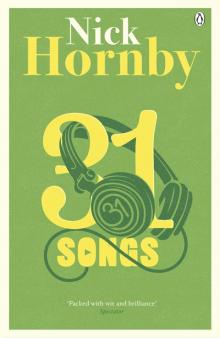 31 Songs
31 Songs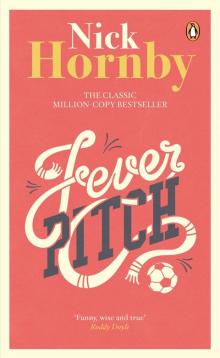 Fever Pitch
Fever Pitch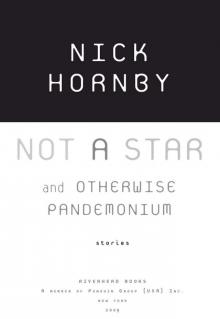 Not a Star and Otherwise Pandemonium
Not a Star and Otherwise Pandemonium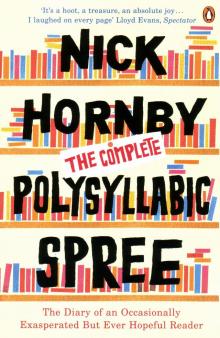 The Complete Polysyllabic Spree
The Complete Polysyllabic Spree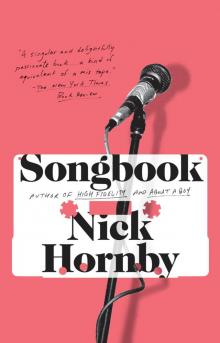 Songbook
Songbook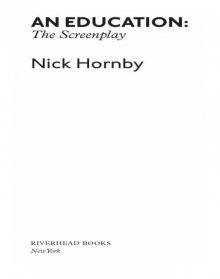 An Education
An Education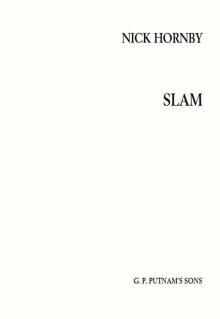 Slam
Slam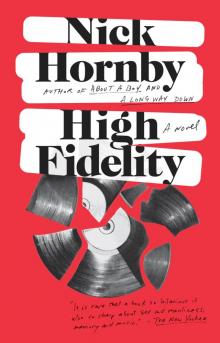 High Fidelity
High Fidelity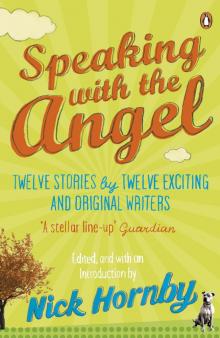 Speaking With the Angel
Speaking With the Angel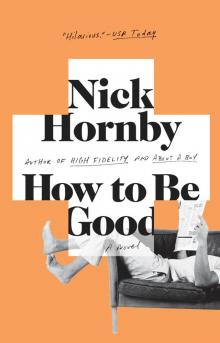 How to Be Good
How to Be Good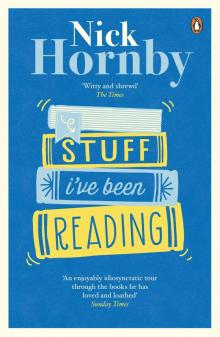 Stuff I've Been Reading
Stuff I've Been Reading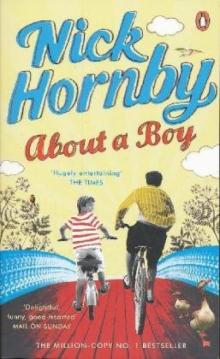 About a Boy
About a Boy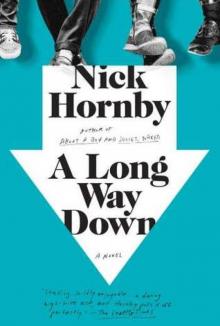 A Long Way Down
A Long Way Down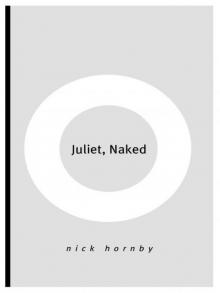 Juliet, Naked
Juliet, Naked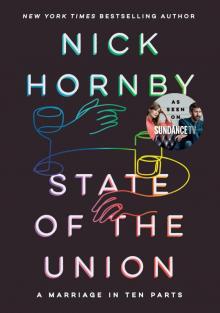 State of the Union
State of the Union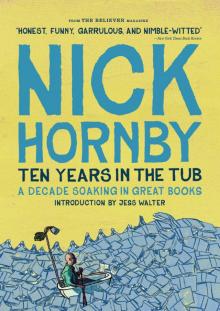 Ten Years in the Tub: A Decade Soaking in Great Books
Ten Years in the Tub: A Decade Soaking in Great Books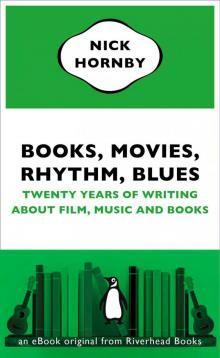 Books, Movies, Rhythm, Blues: Twenty Years of Writing About Film, Music and Books
Books, Movies, Rhythm, Blues: Twenty Years of Writing About Film, Music and Books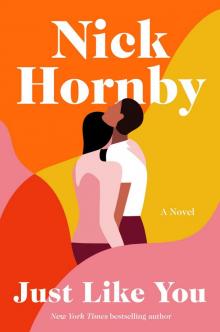 Just Like You
Just Like You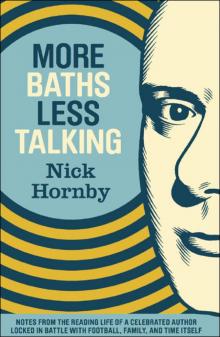 More Baths Less Talking
More Baths Less Talking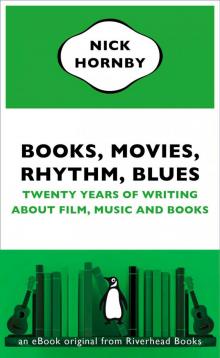 Books, Movies, Rhythm, Blues
Books, Movies, Rhythm, Blues